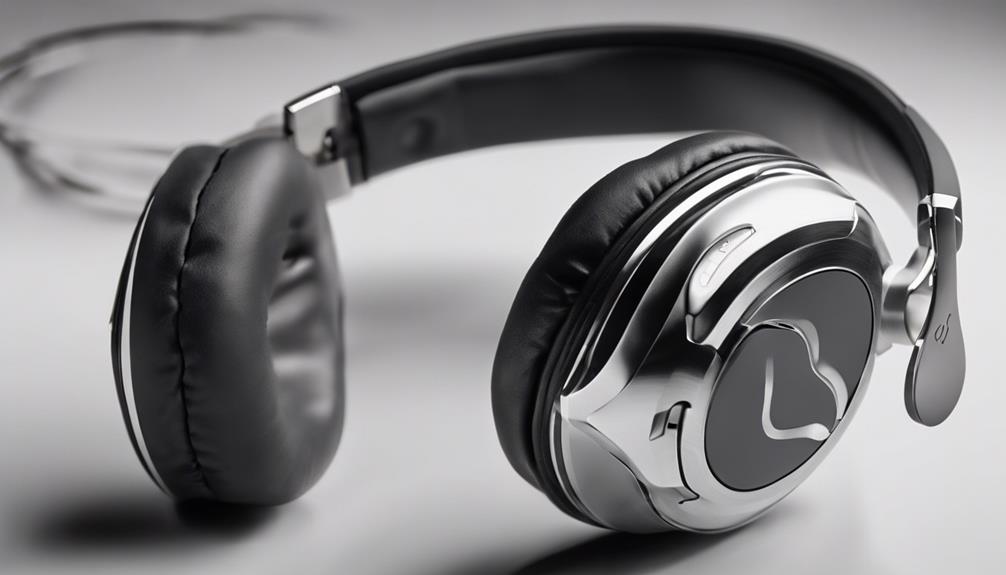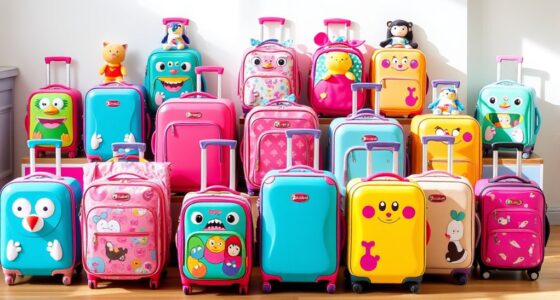Avoid tackling your entire room at once, as it can feel overwhelming and stall your progress. Instead, focus on small, manageable sections like shelves or corners. Don’t hold onto items you no longer need—evaluate each one to create space and reduce clutter. Categorize your belongings clearly to make decisions easier, and use sustainable storage solutions. Establish a maintenance routine to keep clutter at bay long-term. Keep going, and you’ll discover more strategies to stay organized.
Key Takeaways
- Stop rushing through decluttering; instead, break the task into manageable sections for less overwhelm.
- Avoid holding onto unnecessary items; instead, evaluate if you’ve used them in the past year before deciding to keep.
- Don’t skip categorizing items; instead, use labeling and sorting to simplify decision-making and enhance organization.
- Refrain from using wasteful storage solutions; instead, choose eco-friendly, durable containers that promote sustainability.
- Stop relying on quick fixes or immediate tosses; instead, adopt mindful decision-making for lasting clutter control.

Koss CL3i Clear Transparent in-Ear Bud, Retro Style, in-Line Micrphone and Remote, 3.5mm Wired Plug
CLEAR DESIGN - CL3i features a clear, transparent design for a unique retro look.
As an affiliate, we earn on qualifying purchases.
Avoid Tackling the Whole Room at Once
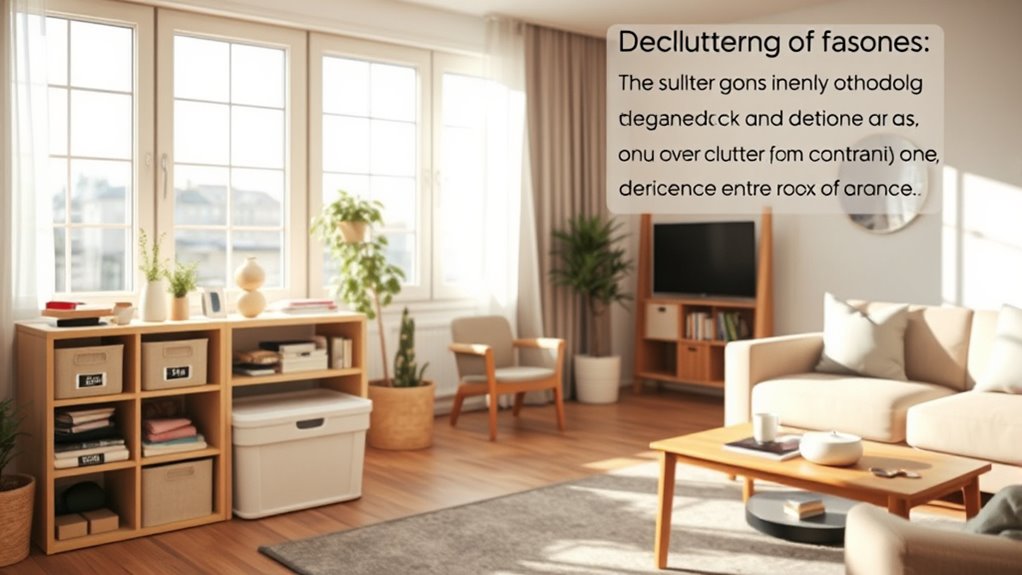
Trying to declutter an entire room all at once can feel overwhelming and discouraging. Instead, adopt a room by room planning approach, breaking the task into manageable sections. This helps you stay focused and prevents burnout. Your decluttering mindset should shift from viewing the whole room as a single obstacle to seeing it as a series of smaller goals. Tackle one corner or shelf at a time, celebrating each small victory along the way. This method keeps you motivated and makes the process less formidable. Remember, progress is cumulative; completing one section boosts your confidence for the next. Additionally, creating designated zones can streamline your efforts and make maintaining organization easier. By avoiding the mistake of trying to do everything at once, you’ll find decluttering becomes more achievable and less stressful.

Koss CL/2 Clear Transparent On-Ear Headphone, 80s and Style, Retro Look, Lightweight, 3.5mm Jack, 6 Foot Cord
CRYSTAL CLEAR SOUND: The Koss CL/2 delivers balanced, accurate audio reproduction through lightweight yet durable full-size circumaural earcups.
As an affiliate, we earn on qualifying purchases.
Stop Holding Onto Items You No Longer Need
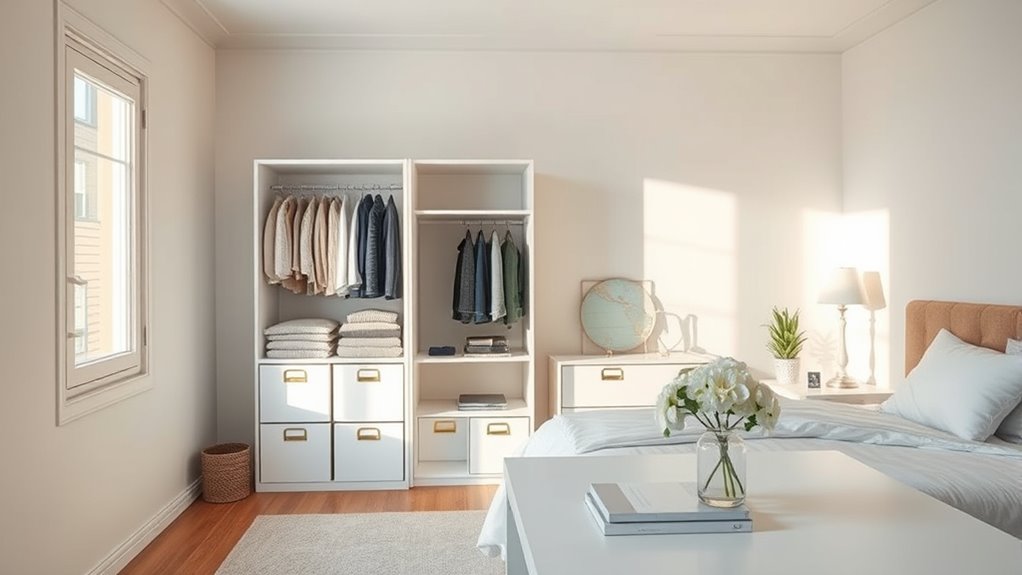
Holding onto items you no longer need can clutter your space and make decluttering more difficult. Emotional baggage and sentimental clutter often cause you to hang onto things out of guilt or nostalgia. However, these items can weigh you down mentally and physically. Ask yourself if you’ve used or needed the item in the past year. If not, it’s time to let go. Remember, keeping items out of obligation or emotional attachment only adds to your clutter. Release the guilt and focus on what truly matters now. Removing unnecessary belongings creates space for new experiences and reduces stress. By decluttering these items, you regain control of your environment and free yourself from the emotional weight of unnecessary possessions. Additionally, understanding the importance of contrast ratio in projectors can help you create a more immersive and visually appealing space, whether for home cinema or gaming.

TASCAM TH-02 Professional Studio Monitor Headphones, Wired, Over Ear — for Recording, Podcast, DJ, Music and Guitar, with 1/4 Inch Jack Adapter
Foldable design for easy, compact transport
As an affiliate, we earn on qualifying purchases.
Don’t Ignore the Power of Categorizing Items
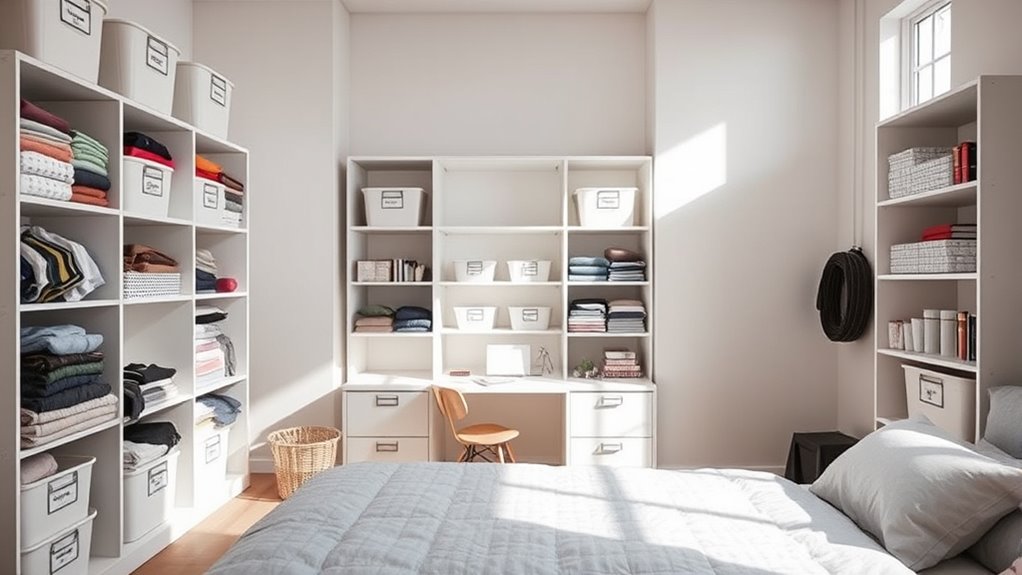
Categorizing items is a powerful step that can make the decluttering process more manageable and efficient. When you use effective labeling strategies and sorting techniques, you create a clear system that simplifies decision-making. Start by grouping similar items into three categories:
- Keep
- Donate/Sell
- Discard
This approach helps you see exactly what you have and prevents unnecessary clutter. Label each container or section clearly, making it easy to identify items at a glance. Sorting techniques like color-coding or alphabetical order can further streamline the process. Remember, the goal isn’t just to move things around but to understand what belongs where. Proper categorization saves time, reduces overwhelm, and sets a solid foundation for a clutter-free space.
![Stop Doing This With Decluttering a Room—Do This Instead 9 USBC Headphones for iPhone 17 16 15,for Apple Headphones Wired with Microphone & Remote Control [Clear Call], Wired Ear Buds USB C HiFi Bass Earphones for Samsung S25 S24 Ultra,ipad,Pixel 9 [2 Pack]](https://m.media-amazon.com/images/I/31DhD-9s9VL._SL500_.jpg)
USBC Headphones for iPhone 17 16 15,for Apple Headphones Wired with Microphone & Remote Control [Clear Call], Wired Ear Buds USB C HiFi Bass Earphones for Samsung S25 S24 Ultra,ipad,Pixel 9 [2 Pack]
【Hifi Stereo Headphones】USBC headphones based on a build-in update chip and 14.2 mm dynamic driver, these headsets ensure...
As an affiliate, we earn on qualifying purchases.
Refrain From Using Wasteful Storage Solutions
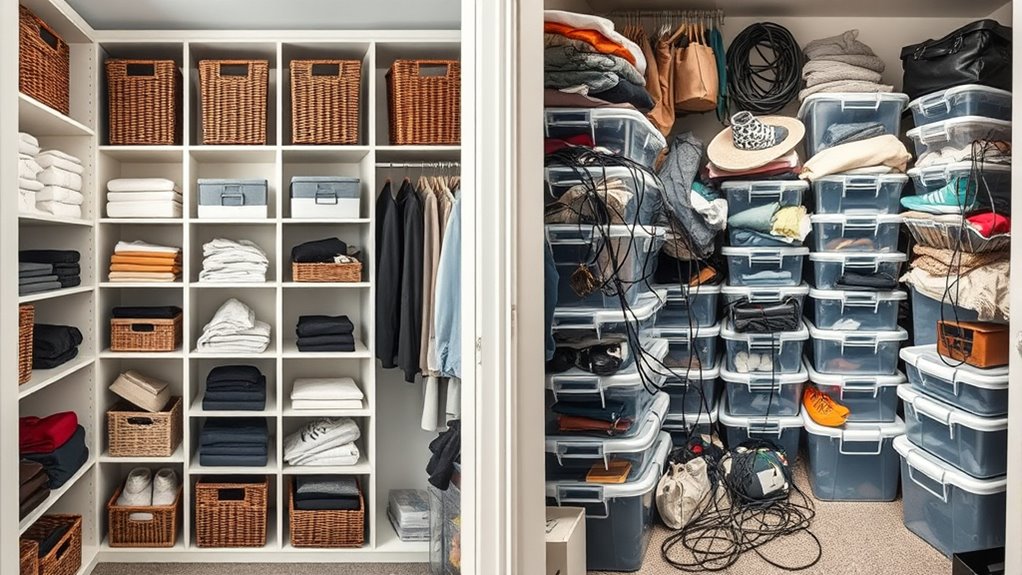
Avoid relying heavily on plastic bins for storage, as they often end up wasteful and short-lived. Instead, opt for sustainable options like bamboo or recycled materials that last longer and are eco-friendly. Choosing smarter storage solutions helps you declutter without harming the environment. Additionally, being aware of potential allergy risks associated with certain storage materials can help you make safer choices for your household.
Subheading 1: Avoid Overusing Plastic Bins
While plastic bins might seem like a convenient storage option, overusing them can lead to waste and clutter in the long run. Relying heavily on plastic waste and disposable containers increases environmental harm and makes your space look chaotic. Instead, consider these alternatives:
- Use eco-friendly containers made from sustainable materials like bamboo or glass.
- Repurpose existing boxes or baskets to reduce waste.
- Opt for stackable, durable organizers that last longer and minimize clutter.
- Incorporate mindful storage practices that promote sustainability and organization.
Overusing plastic bins encourages unnecessary waste and adds to environmental problems. Switching to eco-friendly containers not only reduces plastic waste but also creates a cleaner, more organized space. Be mindful of your storage choices—ditch wasteful solutions and embrace sustainable, long-lasting options for a clutter-free room.
Subheading 2: Choose Sustainable Storage Options
Choosing sustainable storage options is essential for maintaining an organized and eco-friendly room. Opt for eco friendly containers made from biodegradable or recyclable materials to reduce waste. These containers keep your belongings tidy without harming the environment. Consider modular shelving systems that are versatile and durable, allowing you to customize your space as needed. Modular shelving not only maximizes storage but also minimizes the need for multiple storage units, reducing clutter. Avoid wasteful solutions like single-use plastic bins that often end up in landfills. Instead, invest in sustainable options that stand the test of time, supporting both your organization goals and environmental responsibility. Additionally, understanding the importance of WWE Raw’s Financial Impact can inspire you to make smarter choices about resource use and long-term investments. By choosing eco friendly containers and modular shelving, you’ll create a cleaner, greener, and more efficient space.
Skip the ‘Quick Fix’ Sorting Methods
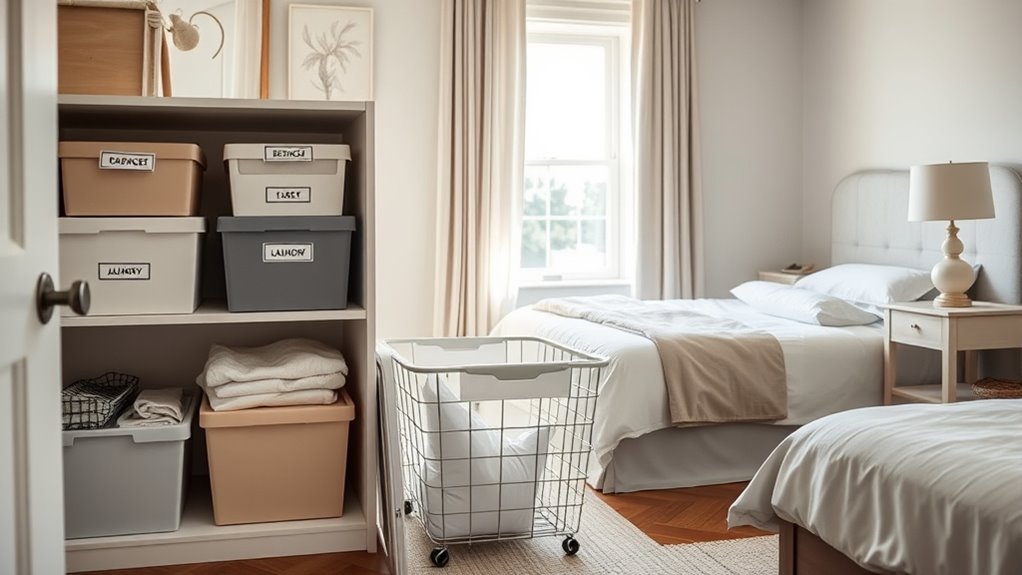
Instead of relying on quick fixes like tossing items into boxes or making hasty decisions, it’s more effective to take the time to evaluate each item carefully. Quick sorting methods often stem from decluttering myths that suggest speed is key, but rushing can lead to clutter returning quickly. Instead, focus on thoughtful organizing techniques that promote lasting clarity. Consider these steps:
Take time to evaluate items carefully for lasting clarity and effective organization.
- Assess whether the item is truly needed or used.
- Decide if it adds value or serves a purpose.
- Determine the best storage solution or if it should be donated or discarded.
- Incorporate mindful decision-making to ensure long-term organization and prevent future clutter buildup.
Don’t Forget to Create a Maintenance Routine

To keep your room tidy, you need a solid maintenance routine. Schedule regular decluttering sessions and set up reminders so it becomes a habit. Be ready to adjust your plan as your needs change to stay organized long-term. Incorporate natural enzyme solutions to help break down organic waste and keep your space smelling fresh.
Schedule Regular Decluttering
Establishing a regular decluttering schedule is essential to maintaining an organized space. Consistency in timing helps you stay on top of clutter and prevents buildup. To make this effective, consider these steps:
- Pick a specific day and time each week for decluttering to build habit and timing consistency.
- Set clear goals for each session to stay focused and accountable.
- Track your progress to reinforce clutter accountability and see your improvements.
- Incorporate a maintenance routine to ensure your space remains organized over the long term.
Set Up Reminders
Have you set up reminders to maintain your decluttering routine? Regular prompts help you stay on top of storage organization and prevent clutter triggers from piling up again. You can use phone alerts, calendar notifications, or sticky notes in key spots to remind yourself to tidy up and reassess your space. These reminders keep decluttering top of mind and make maintenance easier. By establishing a routine, you reduce the risk of clutter sneaking back in and overwhelming your room. Consistent cues also help you recognize clutter triggers early, so you can address them before they take over. Setting up reminders isn’t just about cleaning; it’s about creating a sustainable system that keeps your space organized and clutter-free over time. Incorporating mental clarity and health techniques like mindfulness can further support your efforts by reducing stress related to clutter.
Adjust as Needed
Once you’ve set up reminders to keep your decluttering routine on track, it’s important to recognize that your needs and space may change over time. Regularly adjusting your routine guarantees you maintain space optimization and manage emotional attachment to stored items. To stay effective:
- Review your decluttering goals periodically to reflect any lifestyle changes.
- Reassess items you’re emotionally attached to, deciding whether to keep, donate, or discard.
- Modify your routines based on your evolving space and priorities.
- Incorporate mindfulness practices during decluttering to better understand your emotional responses and make more intentional decisions.
Avoid Overloading Your Storage Spaces

Overloading your storage spaces can quickly turn them into cluttered, inaccessible areas. To maintain effective storage organization, resist the urge to cram everything in at once. Instead, allocate specific zones for different item categories, making it easier to find what you need and reduce clutter. Use storage solutions like bins, shelves, and dividers to maximize space without overfilling. Remember, overloading hampers clutter reduction efforts because it hides items and makes cleanup harder. Regularly assess your storage to remove items you no longer need, preventing buildup. Keep in mind that less is often more—prioritize quality storage options over quantity. By avoiding overloading, you create a cleaner, more functional space where everything has a place, boosting your overall decluttering success.
Stop Ignoring the Emotional Attachment to Possessions
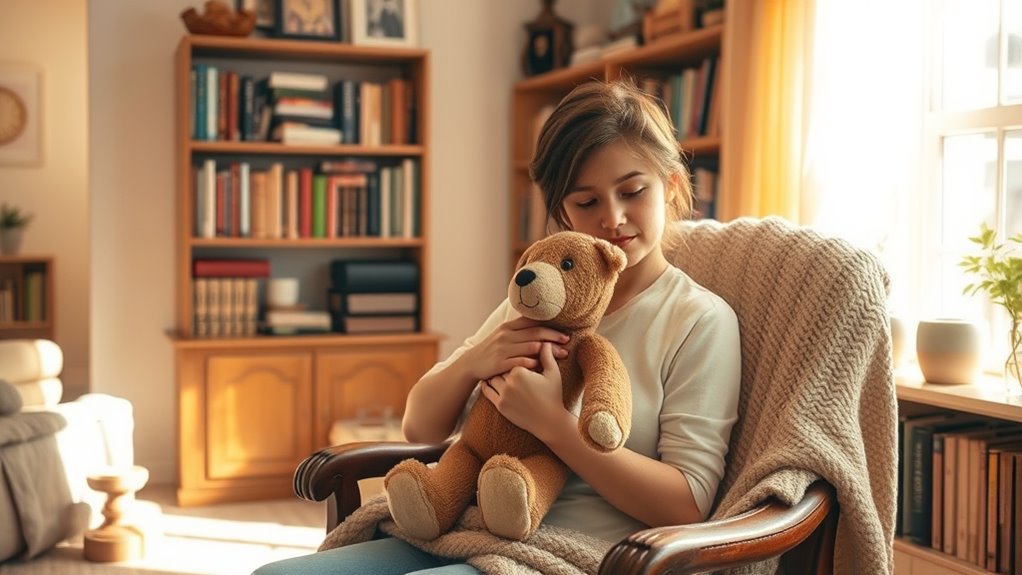
While organizing your storage spaces can help reduce clutter, it’s important to recognize that emotional attachments often complicate decisions about what to keep or discard. Sentimental clutter can make it hard to let go, as you associate possessions with memories or loved ones. Ignoring this emotional baggage only prolongs clutter buildup. To address this, consider these steps:
- Identify items that truly hold meaning, rather than holding onto everything out of habit.
- Reflect on whether keeping an item honors your memories or just preserves unnecessary emotional baggage.
- Set boundaries for sentimental clutter, like limiting keepsakes to a specific box or space.
Frequently Asked Questions
How Can I Stay Motivated During Decluttering?
To stay motivated during decluttering, focus on mindset shifts that emphasize progress over perfection. Break the process into small, manageable tasks, and celebrate each victory to boost your motivation. Use motivational tips like playing your favorite music or rewarding yourself afterward. Remember, maintaining a positive outlook helps you see decluttering as a invigorating opportunity rather than a chore, keeping you energized and committed throughout the journey.
What Tools Are Best for Effective Decluttering?
You should use versatile storage solutions like clear bins, drawer organizers, and shelving to keep things visible and accessible. Sorting techniques, such as categorizing items by type or frequency of use, make decluttering more efficient. These tools help you see what you have, decide what to keep or donate, and maintain an organized space. With the right storage and sorting, decluttering becomes quicker and less overwhelming.
How Do I Decide What to Keep or Donate?
Think of yourself as a wise judge, weighing each item’s story and purpose. Use decision criteria like practicality, frequency of use, and sentimental value to guide you. Keep items that serve a clear purpose or bring genuine joy, and consider donating those with sentimental meaning but limited use. Trust your intuition, and remember, letting go can make space for new memories and opportunities.
How Often Should I Declutter My Rooms?
You should declutter your rooms every three to six months to maintain organization. Use effective storage solutions and organizing methods, like labeled bins or vertical storage, to keep things tidy. Regular decluttering prevents buildup of unnecessary items and makes it easier to find what you need. Set reminders to review your space periodically, ensuring your home stays organized and clutter-free without overwhelming you.
What Are Some Decluttering Mistakes to Avoid?
Did you know that 70% of clutter myths stem from emotional attachment? Avoid making the mistake of holding onto items out of guilt or nostalgia. Instead, focus on practicality and your space’s purpose. Don’t let emotional attachment trap you; recognize it’s okay to let go. By doing so, you’ll declutter more effectively and create a peaceful, functional environment without unnecessary stress.
Conclusion
Remember, Rome wasn’t built in a day, and clutter won’t disappear overnight. Instead of rushing to declutter everything at once, focus on small, manageable steps. Let go of items you no longer need, categorize thoughtfully, and establish a routine to keep your space tidy. By doing so, you’ll create a calmer, more organized environment. After all, slow and steady wins the race—so be patient and consistent with your decluttering journey.



